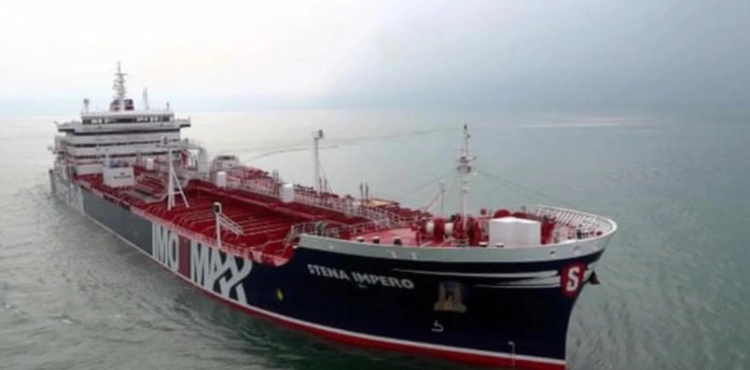Iran has so far ignored calls by the European Union to demand the release of a British-flagged oil tanker seized in the Strait of Hormuz, a move described by Britain as "dangerous" and called for its ships to be avoided. Strait.
The Iranian Revolutionary Guard said it had seized the ship "Stina Impero" on Friday, after violating the "international naval bases" in the strait through which one-third of the amount of oil transported by the world.
Iran seized the tanker off the port of Bandar Abbas in a move justified by the Iranian authorities that the ship did not respond to calls for distress, and extinguished the devices sent after colliding with a fishing vessel.
London, for its part, said that Iran had seized two carriers in the Gulf, but the company owner of the second oil tanker "source" flying the flag of Liberia, said that the ship was released after entering by gunmen for some time.
The incident came hours after a court in Gibraltar announced the extension of the detention of an Iranian oil tanker for 30 days after two weeks of seizure in an operation involving the Royal Navy, on suspicion that it was heading to Syria to deliver a load of oil in violation of US and European sanctions.
On Twitter, Iran´s foreign minister, Mohammad Jawad Zarif, defended Tehran´s detention of the British flag carrier. "Unlike piracy in the Strait of Gibraltar, what we have done in the Persian Gulf is to enforce maritime law," he said.
"Iran is the guarantor of security in the Persian Gulf and in the Straits of Hormuz," he said, referring to the economic sanctions Washington has imposed on Tehran after its withdrawal from the nuclear deal in 2018.
British Foreign Secretary Jeremy Hunt said on Saturday that he had spoken to Iranian Foreign Minister Mohammad Javad Zarif and said he was "very disappointed" after he assured me last Saturday that Iran wanted to reduce tensions and that the Iranians acted differently.
The British Foreign Ministry summoned the Iranian charge d´affaires on Saturday for the detention of the oil tanker, and advised London British ships to stay "outside the area" of the Strait of Hormuz "for a temporary period."
On Saturday, France and Germany called on the Iranian authorities to release the carrier without delay, while Berlin saw its detention as an "additional escalation of an already tense situation" after Washington condemned what it called an "escalation of violence" by Tehran.
The EU foreign ministry expressed its deep concern over Tehran´s detention of the oil tanker, warning that "this development increases the risk of a new escalation under the existing high tension."
The Iranian Revolutionary Guard said on Thursday it had also detained another "foreign tanker" with its 12-member crew on charges of smuggling fuel, without giving further details.
Tensions have been rising in the Gulf since May, particularly with a series of attacks on oil tankers in the region that Washington has accused Iran of being behind. In June, US President Donald Trump canceled air strikes against Iran at the last minute, after the Islamic Republic dropped a US marlin.
The ship "Stina Impero" was heading to Saudi Arabia on Friday when it hit a fishing vessel, according to the authorities of the port of Bandar Abbas in southern Iran, where the ship is currently anchored.
The Director-General of Ports and Maritime Navigation in the province of Hormozkan God Murad Afifi said that experts will investigate the "incident."
"The crew of the tanker, owned by a Swedish party, is 23 people, all aboard," Afifi said, according to Fars news agency. And 18 crew members, including an Indian captain, as well as three Russians, a Latvian and a Filipino.
New Delhi and Manila said they had continued with Tehran as part of efforts to free their compatriots.
Afifi said the fishermen launched a distress call after the collision and contacted port authorities "when they received no response" from the tanker.
"Further investigation is to continue its path for some time and its equipment is extinguished," he told IRNA news agency.
The carrier confirmed that the tanker was crossing the Straits of Hormuz and in "international waters" when "it was attacked by unidentified small boats and a helicopter."
The latest incident was confirmed by Trump and US officials, despite Tehran´s denials, that the US military dropped an Iranian marlin aircraft that was threatening a US Navy ship in the Strait of Hormuz.
Trump confirmed that the tanker was threatening the USS Boxer attack ship.
The Revolutionary Guard published pictures on Friday that it said were refuting US allegations. The seven-minute video, which appears to be high-altitude images, shows a group of ships the Revolutionary Guards said was being tracked as it passed through the Strait of Hormuz.
It was not possible to determine which vessels appeared in the video, but one of them looked similar to the USS Boxer.
With the escalation of tension, Saudi Arabia announced its agreement to receive US troops on its territory in order to promote joint action in "defending the security and stability of the region and ensure peace."
The deployment of US troops is aimed at "ensuring our ability to defend our forces and interests in the region from emerging and real threats," the Pentagon said.
The US military also said it had air patrols monitoring the Strait of Hormuz, adding that it was also developing a "multinational maritime" plan to ensure freedom of navigation on the waterways in the Middle East.
This comes more than a year after the United States withdrew from the Iranian nuclear deal and imposed sanctions on Tehran.
Iran earlier this month surpassed the maximum uranium enrichment under the nuclear deal, with the aim of pressing other parties to the deal to keep their promises to help boost its economy.
Iran has repeatedly threatened to close the Strait of Hormuz if attacked.












